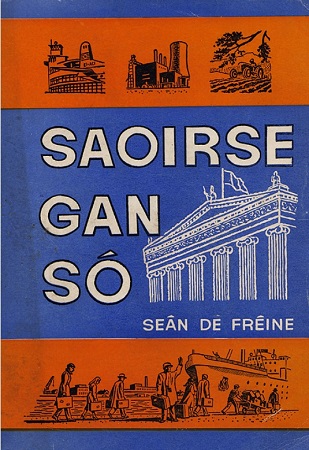Life
Author of The Great Silence: A Study of a Relationship between Language and Nationality (1965), a text that deeply influenced the cultural writings of Joseph Lee, Declan Kiberd, and others; also wrote Saoirse Gan Só (1960), a novel; and poems, Faoi Chabáistí agus Ríonach (2001). FDA
| Poetry |
|
| Fiction |
| Saoirse gan só (Foilseacháin Náiscúnta Teo 1960, 222pp. [see cover]. |
| Commentary |
|
Bibliographical details
The Great Silence: A Study of a Relationship between Language and Nationality, intro. by William F. Mackey [2nd edn.] (Dublin: Foilseacháin Náiscúnta Teo. 1965), 283pp. Do. [another edn.] (Cork: Mercier 1978), 121pp. [Chap. 1: ’A Most Distressful Country’; 13 more sections.) [See extracts.] Note that copy in NLI used to belong to Valentin Iremonger.
[ top ]
Quotations
The Great Silence (1972): ‘[S]ince Ireland has been uniquely affected by language shift and cultural change, one might expect that the Irish people would be particularly well-informed about these matters.’ He continues: ‘It would be fair to say that the exact opposite is nearer the truth. The fortunes of the Irish language have been debated protractedly in the context of its revival in the future, but ignored almost entirely as a subject requiring historical and sociological examination in the context of the part and present. / The situation leading to the abandonment of Irish was traumatic, and the way in which the shift was implemented indicates an emotionally shocking experience. There are a number of points worth considering in this connection: 1. It is not unknown for linguistic groups who switch languages to forget, or to deny, that they ever spoke the original language. 2. The guilt induced in Germany by Nazism has produced recognisable psychological repercussions. People have tended to suppress the memory of Nazism, and to lay the blame on others. 3. Sociologist have noted a psychological reaction in Japan to the adoption of American ways since the war. This has taken the form of hostility to Americans […/] it becomes clear why the memory of the shift was suppressed or pushed back so that it became associated with a much earlier period than was actually the case. naturally it was blamed on the English. […] ‘the shift required the denial of any practical significance or function to the language.’ &c.]’ (The Great Silence, p.92.)
The Great Silence (1972) - cont.: ‘Another consequence of the distortion of history is the amount of bitterness which the telling of Irish history engenders. Irish natioanl survival and constancy in religious adherence must, if normal cultural supports are discounted, be assigned to exceptional inherent qualities of virtue in the Irish as individuals. the Irish have to be seen as a race apart. Naturally, injustice done to a people regared as such will tend to induce more bitterness among them than it would in the case of lesser morrtals. / But the Irish are not as innately good as this interpretation of history requires.’ (ibid.; p.94). Fréine juxtaposes the European rule, cuius regio eius religio, with the Irish principle, is treise tuath na tiarna [the people are stronger than the leader]. (p.95). He argues, ‘A much more healthy attitude will follow from the acceptance of the importance of cultural factors in helping an imperfect Irish people to survive as a nation and to preserve their concept of values despite great difficulties and oppression. Then the history of Ireland becomes transformed: it becomes an inspiring and moving story of victory snatched time and time from the jaws of defeat and daunting physical circumstances.’ (p.96).
The Great Silence (1972) - cont.: ‘Anomie, which was caused originally by the cultural upheaval, has been perpetuated by the inability, due to continuing external influences, to develop new norms appropriate to native cultural values. … Experience shows that rural communities are normally less susceptible to disruptive influences than urbanised ones. … New institutions will be needed to restate and transmit the values of the community. This will hardly happen automatically. (p.109).Finally, ‘Irish nationality can be justified on the grounds that the Irish people have certain basic values and principles which are worth preserving. … Sound is the instinct which craves for a separate nationality in order to preserve and develop those things of worth, cherished by the great majority of the Irish people. / But nationality implies more than the right to be independent. It imposes the obligation of doing all that is necessary to provide the appropriate environment for the development of an integrated personality through and in accordance with the community’s ideas. Since there is no reason for believing that the Irish are fundamentally different form the rest of the human race, there is no reason for believe that when it comes to preserving and developing their ideas and values, they can do without the cultural and institutional means which have been found to be indispensable for others.’ (p.114).
[ top ]
 |
| Cover-image at Vintage Irish Book Covers accessed 08.09.2023. |
| https://hitone.wordpress.com/tag/j-k-lyons |